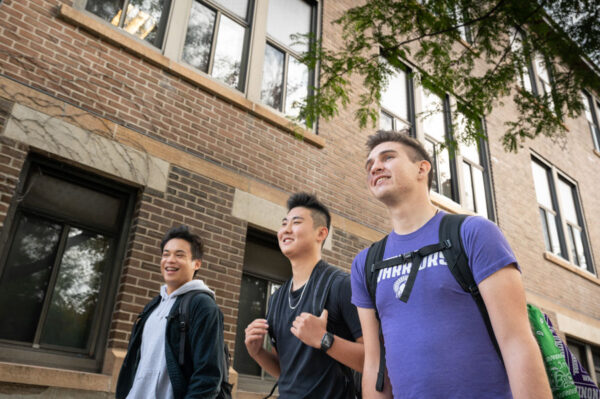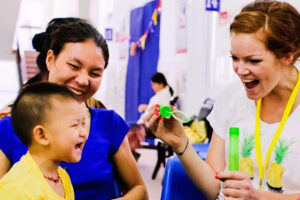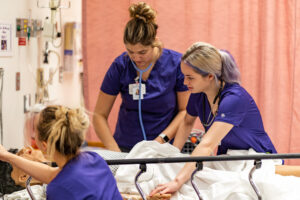
School Health (Teaching)
Bachelor's
PROGRAM SNAPSHOT
Become an advocate for health education. Be ready to work with diverse learners and diverse learning environments.
Effective health education can play a critical role in reducing adolescent health risks, according to the Centers for Disease Control and Prevention.
If you want to make a difference in students’ lives by teaching them healthy behaviors, check out the School Health (Teaching) major at Winona State.
This program features several opportunities for you to gain more than 100 observation and teaching hours in middle and high school classrooms.
You’ll also have the chance to gain experience by presenting at conferences across the country and to volunteer for campus health education labs and community events.
WSU faculty personally consult and train local K-12 teachers on health education, so you’ll learn from the best.
The School Health degree will set you up to apply for licensure and teach grades 5-12 in Minnesota.
This major is also available through WSU’s College of Education and Department of Health, Exercise & Rehabilitation Science.
in scholarships available annually for School Health (Teaching) students through the WSU Foundation.
As a School Health major, you’ll learn how to plan, implement, and evaluate health education curriculum for grades 5-12.
You’ll also:
- practice writing grants to earn funds for your future classroom.
- stay on top of emerging health topics directly impacting youth today.
- understand the characteristics of effective health education programs.
- prepare to teach health electives like advanced health, unified health, adapted health, health careers, mental health, and stress management.
- create engaging lessons about functional health knowledge and skills-based health education using the National Health Education Standards (NHES) and the Health Education Curriculum Analysis Tool (HECAT).
Your coursework will prepare you for careers in K-12 schools, sports clubs, and year-round camps.
Many students double major in School Health and Physical Education to set themselves up for careers centering on health and activity for youth in a community. This major also pairs well with minors in Adapted Physical Education, Adventure Education, and Coaching.
Aside from major- or minor-specific requirements, you’ll need to complete additional requirements through the General Education Program (GEP) to earn your degree from Winona State University.
Learn More about the GEP
In the Classroom
As a School Health major, you’ll take most of your classes in Maxwell Hall and the Integrated Wellness Center (IWC), which houses the Health Education lab.
This is where you’ll begin by taking a personal and community health course where you will be challenged to move towards optimal wellness in your own life and then you will transition into learning about how to guide others towards optimal wellness in their own lives.
And in the curriculum closet, you’ll have access to the latest hand-on learning tools and a curriculum library to use as you go through your courses and into our schools to teach health lessons.
Be one step closer to becoming a health educator by getting the real-world preparation you need along with your degree.
You’ll earn First Aid and CPR certification, with the possibility of an instructor certification, through the American Red Cross.
You’ll also earn adult and child Mental Health First Aid certifications through the National Alliance on Mental Illness (NAMI) to recognize early signs or symptoms and the steps to effectively refer them to support services.
These are among the many tools that will help you become a leader in health education programs in a school district.
Beyond Campus
You’ll complete K-12 classroom observations and student teaching experiences before you graduate.
See classroom management in action and learn how to teach engaging lessons.
Whether you want to stay close to Winona at a regional school, venture back home or somewhere else in the U.S., or travel abroad—your degree can take you there.
Stand out on job applications even further with impressive volunteer experiences.
Teach K-12 students the importance of being safe and healthy by running alcohol, tobacco, and other drug lab activities in the community.
School Health majors can work on creative projects with faculty all year-round.
You may be invited to present at state or national conferences to share your creative project with others in the field.
Previous students have helped lead demonstrations on Brain Games, Fatal Vision Days in Schools, and Mental Health Education.
Apply what you learn in the classroom by traveling the world. At WSU, you can earn credit that counts toward your degree while exploring the globe.
Learn about health promotion in Peru, food systems in Hawaii, and health, exercise, and medicine in England and Ireland.
Or dive into the business of health care in Paris and child welfare and health systems in Jamaica.
You can also student teach in another part of the country or world through Educators Abroad.
Complement your studies and meet other students who are passionate about health education and promotion through a handful of campus clubs and organizations.
Join the Health Organization for Promotion & Education (HOPE) Club, Physical Education (PE) Club, Public Health Club, and Unified Warriors Club.
Check out LeadHERS for Winona State HERS Alumni or Warriors for Kids’ Health.
You can also become a Student Health & Wellness Advocate.
According to the Bureau of Labor Statistics, health education specialist and community health worker positions are expected to grow 12% by 2031.

Bachelor's

Bachelor's

Bachelor's